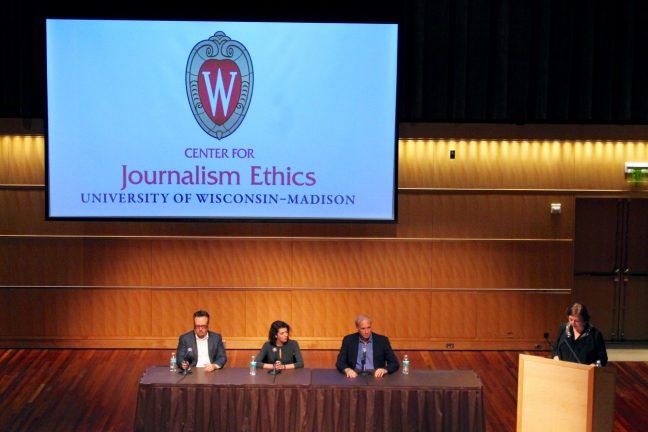A lot of questions have come up since the election of Donald Trump to the United States presidency.
In exploring the role of journalism ethics in elections, particularly in the 2016 presidential race, a panel of journalists hoped to answer if media bias was present during the election and public’s perception of the media moving forward.
Hosted by the University of Wisconsin Center for Journalism Ethics, the panel featured three key panelists:
- Molly Ball, a staff writer who covers U.S. politics for The Atlantic.
- Craig Gilbert, the Washington Bureau Chief for the Milwaukee Journal Sentinel.
- Michael Wagner, an associate professor at the UW School of Journalism and Mass Communications.
Katy Culver, the director of the Center for Journalism Ethics, served as the moderator for the discussion.
Journalists can’t predict outcomes
One question that Gilbert said he’s heard often is “how can the media let this happen?”
At a time where trust in the media is at historic lows and fake news is trending more than real news, Culver said many citizens are concerned with journalists employing biased reporting in their writing.
“Our job is not to guarantee an outcome happens or doesn’t happen,” Gilbert said. “We are accountable [for the result] and that critique is healthy, but I would reformulate the question because it suggests no accountability on the electorate or the candidates.”
While some criticism toward the media is well-intentioned and aimed at improving reporting, Gilbert said journalists should not be criticized for not sharing all of the assumptions their readers hold.
It’s not the job of the media to take sides, Ball said. Instead, journalists ought to be critical and skeptical of all politicians, not getting one or the other to lose the election.
“People would rather attack the messenger than face an unflattering truth,” Ball said.
Speaking to the outcome of the election, Wagner said the media shouldn’t have expected an easy Clinton win in the first place. Getting “swept away” by aggregate polls, Wagner said many journalists overlooked certain problems, such as rural resentment.
Winning states he never led a poll in. No newspaper endorsements. Horrific video. Divided his own party elites. Something deeper is going on
— Mike Wagner (@prowag) November 9, 2016
When Gilbert writes a story, he tries to imagine how different kinds of readers can read it.
“One skill a reporter has to have is to be able to put themselves in the shoes of someone else,” Gilbert said.
Refusal to listen to each other
When society finally draws its own conclusion, often times, people are “biased animals,” Wagner said, which means they tend to choose outlets that tell them we are right, leading them to distrust the other side.
In building trust to familiar news sites, people have come to believe other media is hostile to their own points of view, Wagner added.
Nowadays, Wagner said people judge the source their news is coming from more than the content itself. A large part of that depends on the environment the person is a part of, he added.
“Don’t unfriend the uncle who keeps saying the things that bother you on Facebook. Listen to the other side — don’t try to correct the other side,” Wagner said. “Each side values different things, and we miss that when we don’t listen to what were talking about.”
But the issue is a lot of people don’t want to listen to what the other side has to say, Ball said.
As class divisions are such a big part of the political story, it creates challenges when people attempt to talk about an issue because some news sources tend to be metropolitan institutions, Gilbert said.
“I do think we have an ongoing task to expose Americans to what’s going on in the big picture and the experiences of other people,” Ball said.
Pursuing truth in a ‘post-truth’ era
With fake news circulating, Culver asked the panelists how it’s possible to pursue truth as journalists when sometimes, people do not want to accept it.
As society enters the so-called “post-truth” era, Ball said it’s important for journalists to not validate Trump’s critique on the media. While it is important to point out the truth to readers, reporters shouldn’t be lobbying for their own interests because it puts them in a position in antagonism to Trump, Ball added.
“It’s not new for politicians to take facts out of context, but we must continue calling them out especially if they are saying false things and keep saying them,” Ball said. “It’s our job to show what’s true and what’s not.”
Especially for claims that had no foundation, Gilbert said it’s important to hold people accountable when necessary.
Being kidnapped, held at gunpoint won’t stop UW alumna from documenting war zones
Along with continuing to seek truth, the panelists said readers have a responsibility in understanding the distinction between journalists, reporters and the editorial part of a media organization.
Calling it an “invisible wall,” Gilbert said readers need to understand there is a part that takes sides, and one that doesn’t.
Since readers often don’t see that wall, Ball said it’s up to reporters to be honest about what’s going on in the country.
“Go out and investigate as much as possible,” Ball said. “We didn’t go to sleep in Hillary Clinton’s America and wake up in Donald Trump’s America. It’s still the same country and it’s very divided.”


